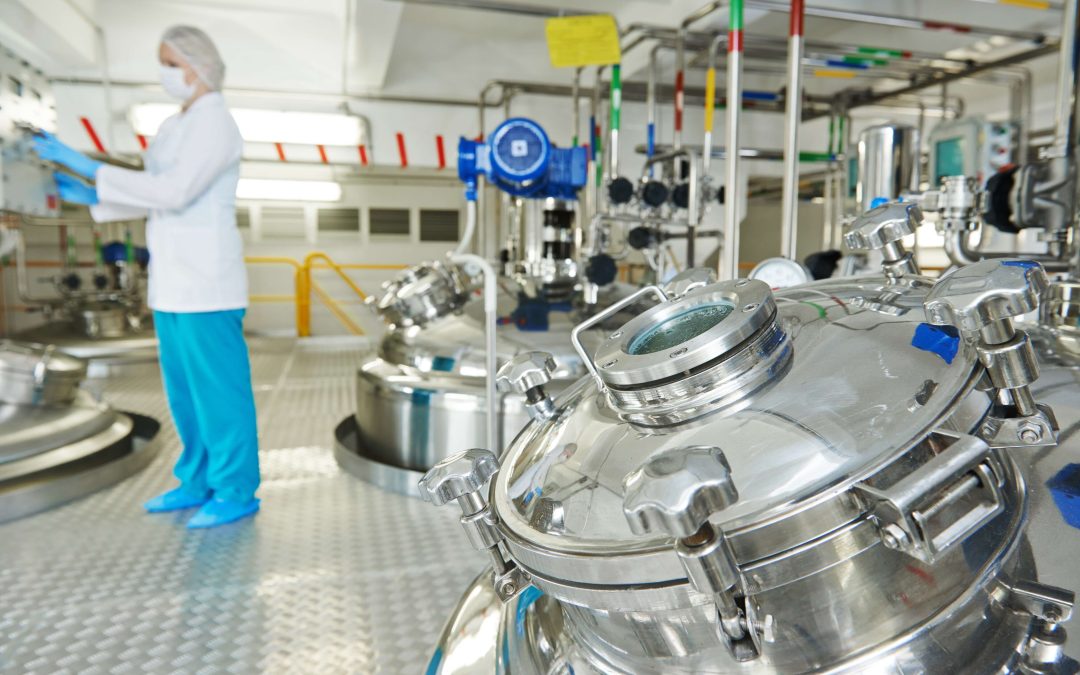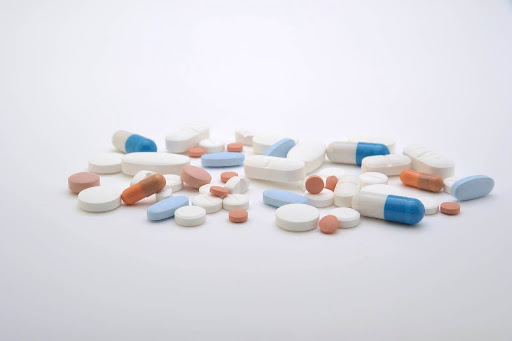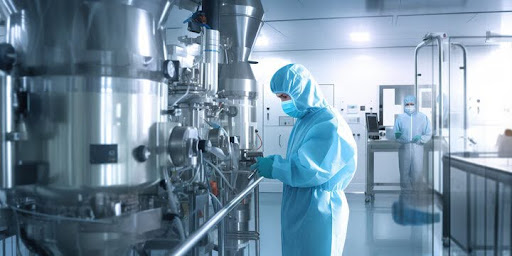
by Vasudha Life Science | Sep 18, 2025 | Blogs
In the fast-paced pharmaceutical world, efficiency, compliance, and innovation go hand-in-hand. But not every pharmaceutical company has the infrastructure or resources to handle large-scale production. That’s where pharma contract manufacturing in India steps into the spotlight. It allows companies to outsource their manufacturing to specialised facilities while focusing on R&D, marketing, and distribution.
This model has become a backbone of the Indian pharmaceutical sector, powering both global exports and domestic supply. But like any strategy, it comes with strengths and weaknesses. Let’s take a closer look at the pros and cons of pharma contract manufacturing in India so businesses can make informed choices.
Why Pharma Contract Manufacturing in India Is Growing
India is known as the “pharmacy of the world.” With affordable labor, advanced facilities, and compliance with international standards, pharma contract manufacturing in India has become a preferred choice for global pharmaceutical giants as well as small domestic players.
But beyond cost savings, the real advantage lies in expertise. Contract manufacturers are dedicated to producing medicines under stringent regulations. By relying on pharma contract manufacturing in India, companies can access state-of-the-art technology without the burden of huge infrastructure costs.
The Pros of Pharma Contract Manufacturing in India
Cost Efficiency
Infrastructure, machinery, and compliance audits are expensive. By partnering with pharma contract manufacturing in India, companies avoid these massive investments while still accessing world-class facilities.
Scalability
Whether it’s a sudden surge in demand or the launch of a new drug, contract manufacturing partners offer flexibility. The scalability provided by pharma contract manufacturing in India is unmatched compared to in-house production.
Regulatory Compliance
Leading manufacturers in India comply with WHO-GMP, USFDA, and EU standards. This makes pharma contract manufacturing in India a trusted option for businesses eyeing global markets.
Focus on Core Strengths
R&D, branding, and distribution are time-consuming. Outsourcing production via pharma contract manufacturing in India frees up resources to strengthen these core areas.
Access to Expertise
From specialized formulations to complex biologics, contract manufacturers bring deep knowledge. Companies leveraging pharma contract manufacturing in India gain access to this pool of expertise without needing it in-house.
The Cons of Pharma Contract Manufacturing in India
Of course, there are challenges as well:
Dependency Risks
Outsourcing production means depending on external timelines. A delay at a pharma contract manufacturing facility in India can disrupt product launches.
Quality Concerns
Not every manufacturer maintains the same level of quality. Choosing the wrong partner in pharma contract manufacturing in India can harm a brand’s reputation.
Confidentiality Issues
Sensitive formulas and trade secrets may be at risk if agreements with a pharma contract manufacturing partner in India aren’t carefully structured.
Limited Control
Companies hand over day-to-day production oversight, meaning they must trust that their pharma contract manufacturing in India partner will uphold agreed standards.
Compliance Variations
While many plants meet international norms, not all facilities offering pharma contract manufacturing in India are equal. Regular audits are necessary to maintain assurance.
Myths vs. Reality
Myth: Pharma contract manufacturing in India is only for large pharmaceutical giants.
Reality: Even small and mid-sized companies rely on pharma contract manufacturing in India to launch products and expand globally.
Myth: Outsourcing means losing complete control.
Reality: With strong contracts and audits, pharma contract manufacturing in India can offer both transparency and reliability.
When Should a Pharma Company Consider Contract Manufacturing?
Here are signs it might be time to partner with a pharma contract manufacturing company in India:
You want to enter a new market quickly without investing in new plants.
Your in-house facility cannot meet growing demand.
You’re exploring new dosage forms or formulations that require specialized expertise.
You want to minimize risks while scaling production.
If any of these apply, pharma contract manufacturing in India could be the right move.
The Bigger Picture: India’s Global Role
India supplies over 50% of vaccines worldwide and is among the top exporters of generics. Much of this success can be attributed to pharma contract manufacturing in India, which makes high-quality medicines affordable and widely available. The sector has also supported innovation by allowing smaller companies to compete with global giants.
Checklist for Choosing the Right Partner
Before selecting a pharma contract manufacturing company in India, ask yourself:
Does the facility have WHO-GMP or USFDA approval?
What is their track record with international clients?
How transparent are they with audits and reports?
Do they offer flexibility in batch sizes and formulations?
The answers will help narrow down reliable partners.
Why Vasudha Life Sciences Should Be Your First Choice
Among the many companies offering pharma contract manufacturing in India, Vasudha Life Sciences stands out as a trusted partner. Here’s why:
State-of-the-Art Facilities: We operate advanced plants that meet WHO-GMP standards.
Expert Team: Our professionals specialize in a wide range of dosage forms.
Flexible Solutions: From small batches to large-scale production, we adapt to client needs.
Global Trust: With an international clientele, Vasudha Life Sciences has built a reputation for reliability and excellence.
By choosing Vasudha Life Sciences, you’re not just outsourcing—you’re partnering with one of the most respected names in pharma contract manufacturing in India.
Final Thoughts
The debate around outsourcing is not about whether to do it but how to do it right. Pharma contract manufacturing in India brings cost savings, expertise, and scalability. At the same time, it requires careful partner selection to avoid risks related to quality and confidentiality.
In today’s competitive pharmaceutical landscape, the companies that succeed are those that balance efficiency with trust. For businesses looking to scale, pharma contract manufacturing in India offers an unbeatable edge—when the right partner is chosen.
Partner with Vasudha Life Sciences today and experience world-class pharma contract manufacturing in India that combines quality, compliance, and reliability. Together, we can transform your pharmaceutical vision into a global success story.

by Vasudha Life Science | Sep 18, 2025 | Blogs
Patients, doctors, and healthcare systems all rely on one critical promise—that the medicines being prescribed are safe, effective, and manufactured under the highest standards. This is exactly where WHO-GMP-approved manufacturing plants step into the spotlight.
India, often called the “pharmacy of the world,” has earned its reputation thanks to a growing network of WHO-GMP-approved manufacturing plants. These facilities are more than just production sites; they are powerhouses that uphold global health standards while making life-saving medicines accessible and affordable.
If you’ve ever wondered what makes the top WHO-GMP certified third-party pharma manufacturers in India stand out, let’s break it down.
Why WHO-GMP Certification Matters
The World Health Organization’s Good Manufacturing Practices (WHO-GMP) guidelines ensure that drugs are consistently produced and controlled according to quality standards. For a pharma company, operating through WHO-GMP-approved manufacturing plants means every batch of medicine undergoes rigorous checks for purity, safety, and efficacy.
Think of it this way—if medicine is the recipe, then WHO-GMP approved manufacturing plants are the kitchens where chefs follow every instruction to perfection, leaving no room for error.
The Role of Third-Party Manufacturing in India
Many pharmaceutical companies today don’t produce their drugs in-house. Instead, they collaborate with third-party manufacturers that run WHO-GMP-approved manufacturing plants. This model allows companies to focus on branding, distribution, and R&D, while ensuring that manufacturing is handled by experts who specialize in quality compliance.
The result? Lower costs, faster scalability, and medicines that meet international benchmarks.
Traits of Top WHO-GMP Certified Third-Party Pharma Manufacturers
Stringent Quality Systems
Every step, from sourcing raw materials to packaging, is governed by protocols inside WHO-GMP-approved manufacturing plants.
Technology-Driven Processes
Leading manufacturers invest in automation, AI, and modern testing equipment to maintain consistency across large volumes.
Flexibility for Clients
Whether a company requires small-batch specialized drugs or mass-market generics, WHO-GMP-approved manufacturing plants can scale accordingly.
Global Reach
Many Indian firms not only serve the domestic market but also export to regulated and semi-regulated markets worldwide.
Expectation vs. Reality in Pharma Manufacturing
Expectation: All plants deliver the same level of quality.
Reality: Only WHO-GMP-approved manufacturing plants truly guarantee consistent compliance with global standards.
Expectation: Certification is a one-time achievement.
Reality: These plants undergo regular audits to maintain certification, ensuring they never compromise on safety.
How WHO-GMP-Approved Manufacturing Plants Empower Pharma Brands
For pharmaceutical companies, partnering with a facility that runs WHO-GMP-approved manufacturing plants brings multiple benefits:
- Assurance of quality for brand reputation.
- Faster entry into international markets due to recognized certifications.
- Reduced infrastructure investment without compromising product excellence.
Essentially, third-party manufacturers with WHO-GMP-approved manufacturing plants act as silent partners, helping pharma brands build credibility and expand globally.
Key Advantages of Choosing WHO-GMP Certified Partners
Regulatory Acceptance: Medicines from WHO-GMP-approved manufacturing plants are more easily accepted by international health authorities.
Risk Mitigation: Strict monitoring reduces risks of recalls, which can otherwise damage a brand’s reputation.
Innovation-Ready: Many facilities are equipped to handle not only generics but also complex formulations, injectables, and biologics.
Myths About WHO-GMP Manufacturing
“Certification is only about paperwork.”
In reality, WHO-GMP-approved manufacturing plants must prove compliance with physical inspections, documentation, and continuous monitoring.
“Only large companies can afford such plants.”
Today, several mid-sized third-party manufacturers also operate WHO-GMP-approved manufacturing plants, making global-quality drugs accessible to smaller pharma firms.
“It slows down production.”
On the contrary, these plants streamline processes, reducing errors and improving efficiency.
Snapshot of India’s Pharma Strength
India is home to thousands of pharmaceutical units, many of which operate as WHO-GMP approved manufacturing plants.
Nearly 50% of global demand for vaccines comes from India.
Third-party pharma manufacturing in India is projected to grow exponentially, thanks to the credibility of WHO-GMP certification.
Why Vasudha Life Sciences Stands Out
Among the many names in the market, Vasudha Life Sciences has emerged as a trusted partner with its WHO-GMP-approved manufacturing plants. Here’s why pharma companies across the globe prefer us:
State-of-the-Art Facilities: Equipped with cutting-edge technology for solid orals, liquids, and other dosage forms.
Uncompromising Quality: Every step is aligned with WHO-GMP standards, ensuring global acceptance.
Flexible Solutions: Whether you’re a startup pharma brand or an established player, our WHO-GMP-approved manufacturing plants adapt to your requirements.
Global Footprint: With exports across multiple continents, we help your brand go international.
At Vasudha Life Sciences, it’s not just about manufacturing—it’s about building trust, sustaining compliance, and empowering partners to scale with confidence.
Final Thoughts
In an era where healthcare demands are skyrocketing, pharma brands cannot afford to take chances with quality. Choosing third-party manufacturers that operate WHO-GMP approved manufacturing plants is no longer optional—it’s essential.
These facilities are the backbone of India’s pharmaceutical dominance, ensuring medicines are safe, reliable, and affordable. For businesses, they offer scalability without compromising compliance. For patients, they ensure that every dose delivers what it promises.
Looking to partner with a trusted leader in the field? Vasudha Life Sciences, with its WHO-GMP-approved manufacturing plants, is here to help your brand grow while maintaining the highest standards of quality and care. Together, we can build a healthier tomorrow.

by Vasudha Life Science | Sep 18, 2025 | Blogs
When you pick up a pack of tablets at your local pharmacy, have you ever wondered where it comes from? In many cases, it’s produced by a generic medicine company in India. Over the years, India has become the world’s pharmacy—not because of flashy marketing or blockbuster drugs, but because of its unmatched ability to produce high-quality generics that save lives across the globe.
So, what makes a generic medicine company in India stand out? Why are global health organizations, hospitals, and patients placing their trust in Indian manufacturers? Let’s take a closer look.
The Rise of the Generic Medicine Company in India
India is not just a country—it’s a phenomenon in the pharmaceutical world. Today, the nation supplies nearly 40% of the U.S.’s generic medicines and is one of the largest providers to Europe and Africa. A generic medicine company in India is not simply copying existing drugs; it’s ensuring that critical medicines are available at affordable prices for billions of people.
What Sets a Generic Medicine Company Apart?
Affordability Without Compromise
A good generic medicine company ensures affordability while maintaining strict quality standards. The idea is simple—patients should not choose between health and cost.
Compliance with Global Standards
Whether it’s the U.S. FDA, WHO, or EU GMP certifications, a trusted generic medicine company in India adheres to rigorous global regulations.
Scale and Speed
From producing life-saving antibiotics to chronic disease medications, these companies can ramp up production quickly in response to emergencies.
Expectation vs. Reality
Expectation: A generic medicine company just makes cheaper copies.
Reality: These companies invest heavily in R&D to ensure bioequivalence, safety, and efficacy. They may not reinvent the molecule, but they reinvent access to healthcare.
Expectation: Only big corporations dominate the space.
Reality: Both large-scale players and medium-sized firms contribute to India’s leadership as a global hub.
Why Patients Rely on a Generic Medicine Company
If you’ve ever battled the rising cost of branded drugs, you already know why generics matter. A generic medicine company gives you the same treatment at a fraction of the price. That’s not just economics—it’s empowerment.
For example, during the COVID-19 pandemic, Indian manufacturers ensured that antivirals, antibiotics, and other supportive medications were available worldwide. Without them, access would have been limited to the wealthiest countries.
Behind the Scenes: Life at a Generic Medicine Company
Working inside a generic medicine company is far from boring. It’s a mix of science, precision, and problem-solving. Every batch goes through quality testing, clinical validations, and strict packaging protocols. Whether the medicines are headed for local distribution or international markets, the same uncompromising standards apply.
Employees describe it as being part of a mission bigger than themselves. After all, their work could be the difference between life and death for someone miles away.
How Generic Medicines Drive Global Health
Accessibility: Millions of people in developing countries can afford treatment thanks to a reliable generic medicine company.
Public Health Programs: Governments depend on these companies to supply bulk drugs for vaccination drives, HIV programs, and chronic illness management.
Innovation in Delivery: While the active ingredient might remain the same, many firms innovate with extended-release versions, child-friendly formulations, or safer packaging.
Common Myths About a Generic Medicine Company
“Generics are lower quality.”
Reality: Approved generics must meet the same standards as branded drugs.
“Only the brand matters.”
Reality: A generic medicine company produces identical active ingredients, ensuring the same therapeutic effect.
“Generics are risky.”
Reality: Global regulatory approvals prove they are as safe and effective as branded options.
The Numbers Speak
- Over 8 out of 10 prescriptions in the U.S. are filled with generics.
- India accounts for nearly 20% of global generic exports.
- A single generic medicine company can supply millions of doses daily.
These aren’t just statistics—they’re reminders of how impactful Indian manufacturers are on a global scale.
Why Choose Vasudha Life Sciences?
Among the many names, Vasudha Life Sciences has carved a reputation as a top generic medicine company in India. Here’s why:
- Unwavering Quality: We go beyond compliance, embedding excellence in every stage of pharmaceutical manufacturing.
- Global Trust: Our products are exported to multiple continents, trusted by both healthcare providers and patients.
- Commitment to Accessibility: We believe healthcare should never be a privilege—it should be a right.
When you choose Vasudha Life Sciences, you’re choosing a generic medicine company that combines scientific rigor with a social mission.
Final Thoughts
India’s dominance in generics is not a coincidence—it’s the outcome of years of innovation, regulation, and a patient-first mindset. A generic medicine company here is not just producing tablets; it’s producing hope, access, and global health equity.
For patients, it means treatment at affordable costs. For healthcare systems, it means reliable supply chains. And for society, it means the reassurance that when a health crisis strikes, there’s a dependable partner ready to respond.
If you’re looking for a trusted generic medicine company that blends innovation, compliance, and compassion, Vasudha Life Sciences is your destination. Together, we can make healthcare accessible for everyone, everywhere.

by Vasudha Life Science | Sep 18, 2025 | Blogs
When people hear about pharma manufacturers in India, they often imagine ultra-modern labs with robots churning out miracle pills. While there’s some truth in that vision, the reality is a lot more complex. From stringent regulations to on-the-ground challenges, the world of pharmaceutical manufacturing in India often straddles the line between expectation and reality.
Let’s dive deeper into this fascinating industry, explore the myths, and uncover what really happens inside pharma companies in India and particularly within pharmaceutical companies in Mumbai, a hub for research, development, and global exports.
Expectation #1: All Pharma Manufacturers Are Giant Corporations
Reality: Not all pharma manufacturers in India are colossal conglomerates with sprawling campuses. While big names exist and dominate headlines, the ecosystem is diverse. India is home to thousands of medium and small-scale manufacturers that contribute significantly to the supply of generic medicines. These smaller firms may not have flashy infrastructure, but they often specialize in niche areas of pharmaceutical manufacturing, making them equally vital.
Expectation #2: Pharmaceutical Companies in Mumbai Only Focus on Exports
Reality: Yes, Mumbai is an export powerhouse for medicines, but that’s not the whole picture. Many pharmaceutical companies in Mumbai also focus heavily on the domestic market, providing affordable drugs to millions of Indians. These firms balance international compliance standards while addressing local health challenges like infectious diseases and chronic conditions.
Expectation #3: Pharmaceutical Manufacturing is Just About Making Pills
Reality: When people picture pharma companies in India, they often think only of tablets and capsules. In truth, pharmaceutical manufacturing covers a wide spectrum—injectables, ointments, syrups, vaccines, and even cutting-edge biologics. Advanced labs in India are also engaged in developing biosimilars and complex generics that compete globally.
The Numbers Don’t Lie
India supplies more than 20% of the global demand for generics.
Over 3,000 registered pharma manufacturers in India operate across multiple states.
The country’s pharmaceutical exports crossed $25 billion in 2023, with the U.S. and Europe as key markets.
This sheer scale shows why expectations can differ so much from reality—most outsiders see only the big names, while the true picture is far broader and richer.
Expectation #4: Compliance is Optional
Reality: In today’s market, compliance is non-negotiable. Whether it’s FDA approvals for exports or WHO-GMP certification, pharma companies in India face rigorous checks. Falling short can mean losing access to lucrative global markets. While the expectation is often that regulations are relaxed in India, the reality is that manufacturers work tirelessly to meet international quality benchmarks.
Expectation #5: Pharma Manufacturers Are Only About Profits
Reality: While profits are important, many pharmaceutical companies in Mumbai and beyond are deeply invested in corporate social responsibility. From affordable pricing models to vaccine drives and rural outreach programs, these companies recognize that their role is not just to make medicines but also to improve public health outcomes.
The Innovation Gap: A Common Debate
One criticism often leveled at pharma manufacturers in India is that they focus too heavily on generics and not enough on innovation. The expectation is that every company should be producing “the next big drug.”
Reality check: Innovation is expensive and time-consuming. While a few big pharma companies in India are investing in R&D pipelines, smaller firms focus on delivering cost-effective, life-saving drugs at scale. Both approaches are necessary to balance innovation with accessibility.
Inside Pharmaceutical Manufacturing: What’s Really Happening
Behind the scenes, pharmaceutical manufacturing is a highly detailed process:
Research and Development – Identifying molecules or formulations that meet specific health needs.
Clinical Trials – Testing effectiveness and safety before mass production.
Production – From raw material sourcing to drug formulation in specialized facilities.
Packaging and Distribution – Ensuring compliance, labeling, and global delivery.
This complexity highlights why the industry is more than just “mixing ingredients in a lab.”
Expectation vs. Reality – A Quick Recap
- Expectation: Pharma in India is dominated by big corporates.
Reality: A thriving mix of big and small players keeps the ecosystem alive.
- Expectation: Companies only export.
Reality: Domestic markets are equally important.
- Expectation: Pharma = Pills.
Reality: It’s everything from vaccines to biologics.
- Expectation: Regulations are loose.
Reality: Compliance drives the industry.
Why This Matters to You
For patients, understanding the reality of pharma manufacturers in India helps build trust in the medicines they consume daily. For investors, the balance between affordability, innovation, and compliance shows the industry’s resilience. And for global healthcare, India’s scale ensures that life-saving drugs remain accessible to millions worldwide.
Vasudha Life Sciences: Bridging Expectation and Reality
At Vasudha Life Sciences, we understand both sides of the story. While the expectations around pharmaceutical manufacturing are high, the reality is that delivering quality medicines requires expertise, dedication, and a strong ethical foundation. As one of the trusted names among pharma companies in India, we are committed to innovation, compliance, and social impact.
Our base in Mumbai places us at the heart of one of the most dynamic pharmaceutical ecosystems. But our reach extends globally, ensuring our products meet the highest international standards. Whether it’s generics or specialized drugs, we bridge the gap between what people expect and the realities of safe, affordable, and effective healthcare.
Final Thoughts
The truth about pharma manufacturers in India lies somewhere between expectation and reality. While movies or headlines may paint an oversimplified picture, the real story is one of diversity, compliance, innovation, and resilience. Both pharma companies in India and pharmaceutical companies in Mumbai continue to prove that the industry is as much about delivering social good as it is about business growth.
At Vasudha Life Sciences, we invite you to see this truth up close. Partner with us and experience pharmaceutical solutions that align with global standards while staying true to India’s mission of making healthcare accessible for all.

by Vasudha Life Science | Aug 21, 2025 | Blogs
Since 2014, Vasudha Life Science has been a trusted partner in Pharmaceutical Contract Manufacturing In Karnataka, delivering high-quality solutions across formulations, tablets, and capsules. With WHO-GMP certified facilities, we ensure global compliance, making us a preferred partner for businesses seeking scalable and cost-effective CDMO services.
Our end-to-end CDMO expertise includes:
- Formulation development (tablets, capsules, powders, liquids)
- Regulatory and documentation support for domestic & international markets
- Technology transfer & scale-up
- Quality assurance & compliance with WHO-GMP, GLP, and ISO standards
With a global client base across Asia, Europe, and Africa, we bring credibility, trust, and innovation to every partnership. Case studies highlight our ability to meet tight deadlines while ensuring quality, giving businesses confidence in outsourcing manufacturing with us.
Why Karnataka is a Hub for Pharma Contract Manufacturing
Strategic Location & Infrastructure
- Karnataka, with Bangalore, Mysore, and Hubli as key pharma clusters, offers excellent connectivity to international markets.
- State policies support pharmaceutical R&D and manufacturing, making it one of India’s fastest-growing pharma hubs.
Skilled Workforce & Technology
Regulatory & Compliance Edge
- Presence of WHO-GMP and US-FDA compliant facilities.
- Government initiatives under “Pharma Vision 2020” encouraging investment and exports.
Leading CDMO Services in Karnataka
Vasudha Life Science stands among the top pharma CDMOs in Karnataka, providing customized solutions for:
| Service | Details |
| Formulation Development | Tablets, capsules, powders, syrups |
| Regulatory Support | Dossiers, filings, approvals |
| Custom Manufacturing | Bulk and small-batch runs |
| Packaging & Distribution | Global-standard packaging solutions |
| Technology Transfer | Lab to commercial scale-up |
Benefits of Contract Manufacturing in Karnataka
- Scalability – Expand production without heavy capital investment
- Cost-Effectiveness – Reduce operational overheads while maintaining quality
- Innovation – Access advanced R&D capabilities
- Compliance – Ensure products meet WHO-GMP, ISO, and international standards
- Global Reach – Export-ready formulations backed by regulatory documentation
FAQs on Pharma Contract Manufacturing in Karnataka
Karnataka offers strong infrastructure, skilled talent, and globally compliant manufacturing facilities, making it a preferred pharma hub.
We specialize in formulation development, regulatory support, custom manufacturing, and packaging, with WHO-GMP certified processes.
Yes, Vasudha Life Science operates WHO-GMP certified facilities, ensuring compliance with global standards.
It enables scalability, reduces costs, and provides access to expertise without investing in infrastructure.
Bangalore, Mysore, and Hubli are emerging as strong pharmaceutical manufacturing clusters.
Partner with Vasudha Life Science for compliant, scalable, and reliable contract manufacturing in Karnataka. Connect with us today to explore tailored CDMO solutions for your business.

by Vasudha Life Science | Aug 20, 2025 | Blogs
The pharmaceutical industry is one of the fastest-growing sectors globally, and with rising demand for medicines, dietary supplements, and healthcare products, efficiency in production has never been more crucial. This is where the concept of third-party manufacturing in pharma comes into play. More than just a business strategy, it is a collaboration that helps companies scale, cut costs, and maintain quality. For businesses that want to enter the pharma space or expand their existing product lines, partnering with a third-party pharma manufacturing company is the smartest move.
What is Third-Party Pharma Manufacturing?
Third-party manufacturing is a process where one company outsources the production of its pharmaceutical products to another. The Third-Party Pharma Manufacturing Company handles everything from formulation to packaging, while the brand owner focuses on marketing and distribution.
This model has gained immense popularity, especially among startups and mid-sized pharma businesses that lack the infrastructure or resources for full-scale manufacturing. By collaborating with an experienced third-party pharma manufacturing company, businesses can leverage state-of-the-art facilities, expertise, and economies of scale without the heavy capital investment.
Why Businesses Choose Third-Party Pharma Manufacturing
Cost-Effectiveness
Building a pharmaceutical plant requires huge investments. Partnering with a third-party pharma manufacturing company eliminates these costs while still providing access to top-quality production.
Focus on Core Strengths
For many brands, marketing and distribution are the real strengths. Outsourcing to a third-party pharma manufacturing company allows them to concentrate on branding while experts handle production.
Scalability
Whether you need small batches for testing or large-scale production for global distribution, a third-party pharma manufacturing company offers flexible solutions tailored to your needs.
Regulatory Compliance
Reputable manufacturers follow strict guidelines such as GMP (Good Manufacturing Practices) and WHO standards. Working with a trusted third-party pharma manufacturing company ensures your products meet global quality benchmarks.
The Role of a Third-Party Pharma Manufacturing Company
The contribution of a third-party pharma manufacturing company goes beyond just producing medicines. They bring a wide range of services, including:
Product Development: From concept to formulation.
Quality Testing: Ensuring every product meets required standards.
Packaging Solutions: Creating professional and compliant packaging.
Documentation & Compliance: Assisting with approvals and certifications.
By offering end-to-end solutions, a third-party pharma manufacturing company becomes a partner in growth rather than just a service provider.
Advantages of Partnering with a Third-Party Pharma Manufacturing Company
Access to Expertise: With years of experience, a third-party pharma manufacturing company understands the nuances of production.
Time-Saving: Faster production cycles help brands launch products quickly.
Wide Product Range: From tablets and capsules to syrups and injections, a good Third-Party Pharma Manufacturing Company provides a diverse portfolio.
Risk Management: Outsourcing minimizes risks related to infrastructure investments and compliance management.
In today’s competitive landscape, these advantages can make the difference between a struggling brand and a thriving one.
How to Choose the Right Third-Party Pharma Manufacturing Company
With so many options available, selecting the right partner requires careful consideration. Here are a few factors to keep in mind:
Reputation: Look for a third-party pharma manufacturing company with a proven track record and strong market presence.
Certifications: Ensure compliance with GMP, ISO, and WHO standards.
Product Range: The broader the manufacturing capabilities, the better the partnership.
Infrastructure: A reliable third-party pharma manufacturing company will have modern equipment, advanced labs, and efficient processes.
Client Support: Look for partners who offer assistance with documentation, packaging, and even marketing insights.
Choosing wisely ensures long-term collaboration and sustainable business growth.
Future of Third-Party Pharma Manufacturing in India and Beyond
The global pharmaceutical industry is leaning heavily on outsourcing models. In India, for instance, third-party manufacturing is booming thanks to cost-effective infrastructure and skilled expertise. Many international firms rely on Indian partners as their third-party pharma manufacturing company, given the country’s reputation as the “pharmacy of the world.”
With increasing demand for generics, nutraceuticals, and specialty medicines, the future of this model is bright. Innovation, affordability, and global reach will continue to drive collaborations between pharma brands and third-party pharma manufacturing company partners.
Why Third-Party Manufacturing is a Win-Win
For startups, outsourcing removes entry barriers. For established companies, it expands capacity and reduces overheads. For patients, it ensures medicines are available, affordable, and safe.
In essence, a Third-Party Pharma Manufacturing Company acts as the silent force behind many of the products you see on shelves, ensuring consistent supply and unwavering quality. It is a win-win strategy for all stakeholders involved manufacturers, brand owners, and consumers.
Conclusion
The pharmaceutical industry thrives on trust, innovation, and accessibility. At the heart of this ecosystem lies the concept of third-party manufacturing, which bridges gaps between demand and supply efficiently. Partnering with a reliable third-party pharma manufacturing company not only cuts costs but also guarantees quality and scalability.
Whether you’re a new player looking to enter the market or an established brand aiming to expand your portfolio, third-party manufacturing offers the perfect pathway to success.
At Vasudha Lifescience, we take pride in being a trusted third-party pharma manufacturing company that delivers excellence, innovation, and reliability. With cutting-edge infrastructure, strict quality standards, and a client-first approach, we help pharmaceutical brands turn their vision into reality.
Partner with Vasudha Lifescience today and experience how a world-class third-party pharma manufacturing company can accelerate your growth in the competitive pharmaceutical landscape.











